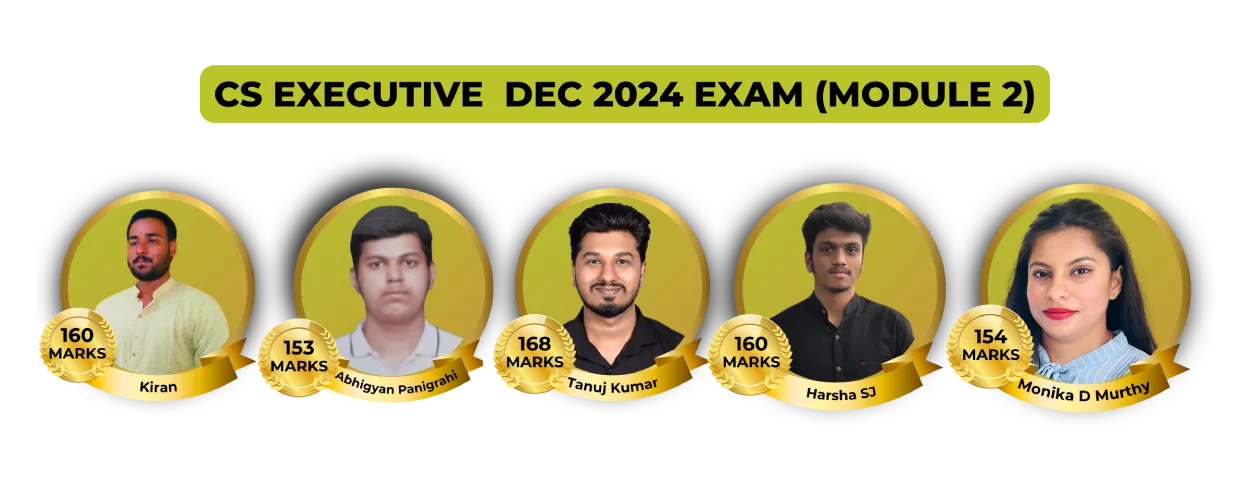Build a Prestigious Career in Corporate Law, Compliance & Governance
Build a Prestigious Career in Corporate Law, Compliance & Governance
At ProTree Academy, we prepare ambitious students to become successful Company Secretaries through expert-led classes, personalised mentoring, real-world knowledge, and a disciplined study approach.
Whether you’re starting from Class 11/12 or preparing for CS Executive/Professional, we guide you at every step with clarity and confidence.
Gain Your Competitive Edge for Success
Why Choose ProTree Academy for CS Coaching in Mysuru?
✔ Mentored by Qualified Professionals
Learn directly under CS Aarti Panigrahi, founder of ProTree Academy — known for her practical exposure in corporate law, governance, and student mentorship.
✔ Concept-Based + Practical Learning
We teach “why things work” — not just the syllabus.
Students gain clarity in:
-
Capital Markets
-
Company Law
-
Corporate Governance
-
Securities Laws
-
Drafting & Compliance
✔ Personal Guidance for Every Student
We offer:
-
1:1 doubt-solving
-
Study planning
-
Exam strategy
-
Weekly performance tracking
-
Emotional support for stress & confusion
✔ Updated Notes + Smart Digital Backup
Get structured notes, summaries, revision capsules, mock tests & recorded backups.
✔ Small Batches for Maximum Attention
Every student receives personalised focus — no overcrowded classes.
Start Your CS Journey with the Most Trusted Commerce Academy in Mysuru.
CA Courses We Offer
CS Executive (New Syllabus)
-
Eligibility: After 12th or CSEET
Subjects include:-
Jurisprudence & Interpretation
-
Company Law
-
Corporate Accounting & Taxation
-
Capital Markets & Securities Laws
-
Economic/Commercial Laws
-
Setting Up Business Entities
-
Drafting, Pleadings & Appearance
-
Governance, Risk & Compliance
-
What you get:
✔ Full syllabus coverage
✔ Case studies, legal interpretations
✔ Practical examples from real corporate scenarios
✔ Monthly tests + mock exams
CS Professional
-
Eligibility: After CS Executive
Advanced learning in:-
Corporate governance
-
Drafting & pleadings
-
Secretarial audit
-
Restructuring
-
Compliance management
-
SEBI/ROC/NCLT procedures
-
What you get:
✔ Section-wise clarity
✔ Practical exposure
✔ Board meeting & drafting simulations
✔ Interview & career guidance
⭐ What Makes Stand Out?
✔ Corporate-Reality Based Teaching
Students learn exactly how companies operate legally and strategically.
✔ Structured Study Roadmap
Every student follows a step-by-step process—from classes to revision to final strategy.
✔ Mindset, Discipline & Confidence Building
We train students not only to pass exams but to think like corporate professionals.
✔ Consistent Mentorship
From academics to stress management — ProTree supports you throughout your journey.
🌟 Career Opportunities After CS
As a qualified Company Secretary, you can work in:
-
Listed & private companies
-
Secretarial audit firms
-
SEBI/ROC/NCLT advisory firms
-
Law firms & consulting companies
-
Corporate governance & compliance roles
-
Capital market institutions
-
Entrepreneurial consultancy
CS is one of the fastest-growing corporate careers with excellent long-term stability.
⭐ Who Should Join This Course?
-
Class 11 & 12 commerce students
-
CS Executive aspirants
-
CS Professional aspirants
-
Working professionals planning to switch to corporate law
-
Anyone aiming for a prestigious corporate governance career
Student Success at ProTree
Our students gain:
✔ Strong conceptual clarity
✔ Exam confidence
✔ Corporate communication skills
✔ Real-world legal understanding
✔ 1st attempt success through disciplined learning
At ProTree, we don’t just teach — we build futures.

1. Does ProTree Academy offer complete CS coaching?
Yes — we offer CSEET, CS Executive, and CS Professional under the new syllabus.
2. Are recorded lectures available?
Yes, all students receive digital backups and revision lectures.
3. Do you provide career guidance?
Absolutely. We offer corporate exposure guidance, interview preparation, and professional mentoring.
4. Is the batch size small?
Yes, we maintain small batches to ensure personalised attention.
5. How do I join?
You can enroll through our website or visit our Mysuru campus.
Get In Touch
We would love to hear from you! Please feel free to get in touch with us for any queries or information regarding our courses. Our team is always ready to assist you.
Gain Your Competitive Edge for Success

ProTree Academy offers expert-led coaching for CA and CS aspirants with a structured curriculum, personalized guidance, and exam-focused learning. Build a strong foundation, excel with confidence, and unlock your professional future.
Start your CA/CS journey with ProTree Academy today — Enroll Now!
Copyright ©2025 | All rights and content reserved by ALTA Insula Corporate.







